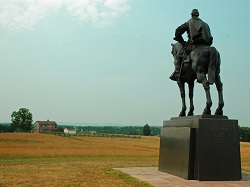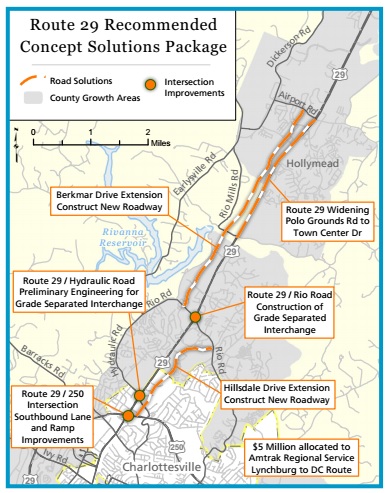Big things are happening, or rather not happening, with the costly Western Bypass of U.S. Route 29 just north of Charlottesville. We’re enthusiastic to report that the ineffective project has come to a halt, and we’re hoping this time it will be a permanent road block. With the Bypass off the table, we can finally get to work on fixing Route 29 for the majority of its travelers.
Transportation Solutions
As high gas prices, traffic congestion, strain on the state budget and concerns about pollution prompt widespread calls for change, PEC supports a new transportation vision for Virginia.
Waterloo Bridge Letter to BOS
The Fauquier Board of Supervisors will hold a public hearing on April 10th, 2014 regarding the Six Year Plan for Secondary Roads. The Six Year Plan outlines planned spending for transportation projects proposed for construction, development, or study for the next six years and is updated each year. The letter below is a request submitted by Piedmont Environmental Council that the long term rehabiliation of the Waterloo Bridge be included in the 2014-2015 through 2019-2020 Six Year Plan.
Save Waterloo Bridge!
The Waterloo Bridge is a valuable piece of the history of Culpeper and Fauquier Counties that was closed to traffic by the Virginia Department of Transportation due to safety concerns in early 2014.

Update on The Bi-County Parkway/Outer Beltway
During his campaign, Governor McAuliffe said he would take a hard-look at the controversial $440 million Bi-County Parkway, reevaluating this project and others proposed by VDOT. In his campaign platform, under the section titled "Pick the right projects; build the best ones," he stated: "We need to strategically prioritize what we’re building and where. We should look at our current and proposed transportation expenditures from top to bottom and support those which should move forward and pull the plug when they don’t make sense."
A Broad List of Opposition to the Outer Beltway
A list of groups who have opposed the Outer Beltway, and a list of elected officials who have publicly opposed or expressed concern.
*this list is a work in progress. If you would like to add your organization or your name to the elected officials list, please contact [email protected]*
The Outer Beltway — Water, Air & Climate Impacts
Email from November 21, 2013: ….yesterday, we joined with more than a dozen prominent conservation organizations — including the National Wildlife Federation, the Virginia League of Conservation Voters, and the Virginia Chapter of the Sierra Club — in submitting a joint letter to Governor-Elect Terry McAuliffe. The letter points to the Bi-County Parkway as the project in Northern Virginia that would have the largest negative impact on the environment….
This Week
VDOT has scheduled two public meetings on the Outer Beltway/Bi-County Parkway. There won't be a public speaking period, but they will be collecting questions and comments. If you cannot attend, I encourage you to submit your comments by email to [email protected]! This email alert was sent out on September 30th, 2013:
Sacrificing History… For What?
Often environmentalists are told that we just 'say no' to things. To which I would argue — saying 'no' to a bad idea is a very important part of what we do. But it's not all we do. At The Piedmont Environmental Council we also strive to put forward constructive alternatives. That's why it's so frustrating to see the Virginia Department of Transportation, led by Sean Connaughton, make mega-projects like the Outer Beltway and Charlottesville Bypass its highest priority. Despite great arguments against both projects — fiscal, environmental, common sense arguments — and plenty of alternatives, VDOT is charging ahead. This text is from an email alert sent out on September 19, 2013:
Transportation Updates
A quick update on the Charlottesville Western Bypass and DC Outer Beltway
Our Alternative — Rethinking the Bi-County Parkway
Our proposal, detailed in the report Rethinking the Bi-County Parkway, focuses on fixing east-west routes for commuters, it provides lower impact local road fixes and connections to help local residents, it preserves the Rural Crescent and Transition Area, and could allow for the roads to be closed through the Battlefield (although it’s not clear that would ultimately be necessary, due to the reduced traffic that would result from implementing the alternatives we’ve suggested).

